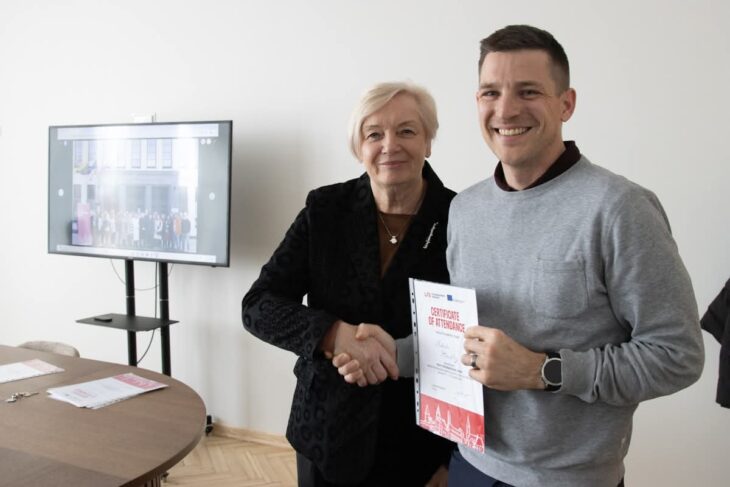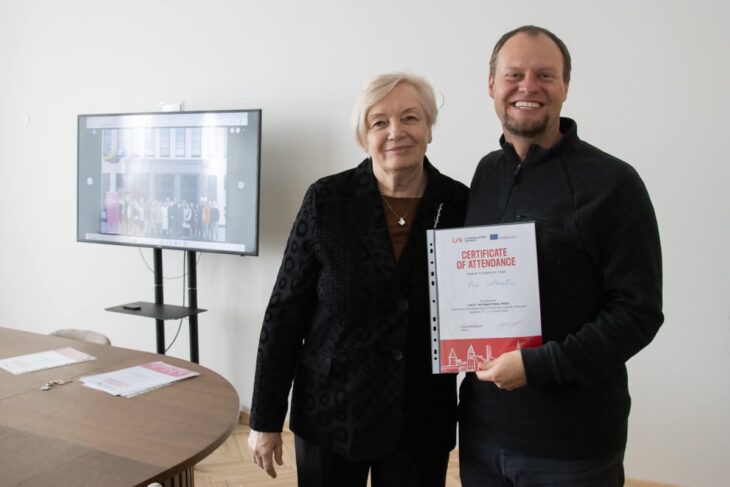
Eric Martin, associate professor of kinesiology, and Blake Densley, clinical assistant professor of kinesiology, recently returned from an international teaching exchange at Lithuanian Sports University, where they participated in a week-long Erasmus+ program — a European Union initiative that supports education, training and international collaboration through faculty and student exchanges. The experience, while exhausting at times, proved to be intellectually stimulating and personally meaningful—offering opportunities for pedagogical exchange, cultural immersion, and future collaboration, they said.
When asked how experiences like this benefit both faculty and students, Densley emphasized the importance of connection and collaboration. “Being able to travel and engage with someone like Eric has been awesome,” he said. “It’s not just about solo opportunities; working with others in these settings is rare and rewarding.”
He added that while the international nature of the trip was enriching, the real focus was on teaching. “It’s not like a research conference where the audience is other scholars. This was about students. It gave us a chance to think about how to make what we teach truly resonate.”
Martin echoed the sentiment, noting that global experiences help faculty stay grounded and self-aware. “We can get caught in the day-to-day,” he said. “Going abroad helps you become more mindful and reevaluate the things you take for granted back home.” From architecture to everyday routines, Martin found himself struck by how different—and yet familiar—life in Lithuania could be.
Both faculty members agreed that the exchange created an opportunity to deepen cross-cultural understanding. Martin noted that the Erasmus+ grant not only funded their visit but could also make similar experiences possible for Boise State students. “When I was an undergrad, if I had heard ‘Lithuania,’ I might not have been excited,” he admitted. “But it’s an affordable gateway to Europe, and the fact that English is widely spoken makes it a great option for study abroad.”
Densley, too, sees a future for collaboration—not only with Lithuanian Sports University but also with other institutions involved in the event. “I’ve already started co-authoring a paper with a colleague from one of the other visiting universities,” he shared.

When asked to sum up the experience in a single word, Densley laughed: “Exhausting. I didn’t sleep for the entire week. I had the worst jet lag of my life.” Martin chose a different word: “Surprising. Some things I thought would be different weren’t—and some things I thought would be familiar were completely new.”
The trip was also filled with memorable moments. One highlight involved a failed attempt to attend a Lithuanian basketball game, the country’s most popular sport. After getting turned away from a professional match, the pair tried to attend a second-division championship, only to be denied again at the door. “We were not destined to see a basketball game,” Martin joked.
There were plenty of laughs, too—especially courtesy of a colleague named Dennis, who quickly dubbed the pair “The Boise Boys.” Densley recalled, “It felt like we were on the HGTV show. It was funny, but it also built camaraderie.”
As Martin reflected, the shared language of sport and physical activity created a sense of unity among attendees from across the globe. “Even when the games are different, the goals are similar: improving the experience, performance, and well-being of participants,” he said.
Both faculty members returned with a deeper appreciation for global education and the role it plays in shaping not only how we teach, but how we see the world.